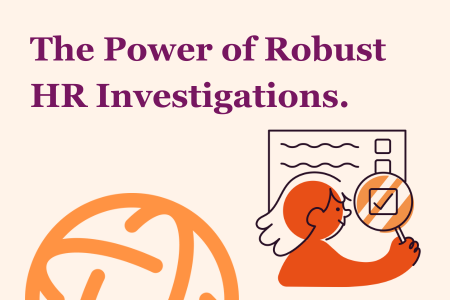In many circumstances businesses are required procedurally or statutorily to conduct HR investigations. These usually manage to establish the facts of the matter, but something that is often overlooked is the quality of the investigation – which is a very important consideration.
Firstly, why do we conduct investigations?
Primarily to establish the evidence and material facts of what has happened and what can be verified or substantiated by witnesses or other forms of evidence such as video or tape recordings. Often what happened is the relatively straightforward part of the investigation. It can be the impact or consequences of the actions or behaviour that can be more difficult to pin down and open to subjective opinion.
Mini Case Study 1 – being thorough is important
Allegations of sexual harassment were raised following a swift interaction between a male and a female employee. This took place in an open plan office environment and was witnessed by close colleagues, therefore what happened could be verified. However, the impact of the act was interpreted differently by the recipient who felt violated and threatened by the act and the alleged perpetrator who considered it “just to be a light touch and a bit of banter” and therefore could not understand why this warranted investigation and potential disciplinary action.
The employer had a choice to make; act and establish boundaries and consequences for inappropriate behaviour or take the view that the employee was being overly sensitive and that no physical harm had been done.
Upon investigation it was discovered that there had been previous examples of messaging which had made the recipient feel uncomfortable about the alleged perpetrator’s motivation and intentions.
This influenced the employer’s decision to take formal action, follow a disciplinary procedure and issue a sanction.
The critical factors
Following policy and procedure is critical to a safe and robust investigation as a breach of policy can undermine the delivery of a safe outcome. Different policies can offer different provisions, so it is essential to check and make sure that, even if it is not convenient, that all policy provisions are met. Maintaining confidentiality and data protection are vital to retain the trust and confidence of the participants and to contain the scope of the investigation within appropriate parameters.
If the outcome of the investigation is that there is no case to answer, the alleged has the right to carry on working and not be adversely affected by the investigation, the allegations or potential damage to relationships with colleagues. This needs careful consideration, honesty and clarity in communication and attention to detail when sharing information.
Ultimately if the investigation is not procedurally sound and/or confidentiality has been breached, this could undermine the progress of potential action, even though the evidence is demonstrating that there is a case to answer, and a high probability of a sanction being applied. Ultimately a tribunal will look at the process and procedure that was followed and consider the fairness of the decision that was implemented. If either or both are found to be at fault the decision could go against the employer in favour of the employee.
Mini Case Study 3 – charitable organisations
Investigations are often carried out on behalf of trustees or voluntary boards of charitable status organisations in which the individuals do not have day to day operational knowledge or contact. Therefore they may not have a full grasp of the details of the subject matter or full and detailed understanding of the regulatory or compliance requirements.
They need to be able to trust the investigator to carry out a full and impartial investigation and present all the relevant information and data in a format that allows them to read their way through the report. The report needs to be presented in a way that allows them to ask questions, make suggestions, take on board different points of view and reach a collective decision.
This can take time and time is money, which can be a scare commodity. But getting it wrong can be even costlier.
The outcome of a recent investigation revealed that the trustees of an organisation had some suspicions about the professionalism of a senior manager and concerns that the organisation was not well represented by the manager. However, they did not have any proof or basis for taking any action. The investigation confirmed their suspicions and gave them a platform from which they could act.
In Summary, we can help
An investigation has many layers of discovery, and the evidence needs to be clearly shared, cross referenced and explained. There is a need for trust and confidence in the relationships with those involved at all stages and procedural compliance is paramount. It is not simply good enough to do an investigation, it needs to be done robustly to allow fair and appropriate decision-making and a safe outcome for all.
This is why many organisations every year trust us at Gravitate to undertake such Investigations on their behalf, and why we are regularly recommended for such projects by other professional advisors. If you have any questions or wish to discuss the possibility of carrying out an investigation please contact us here, or reach out to any member of the team.
